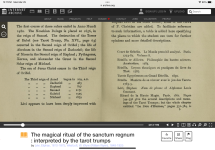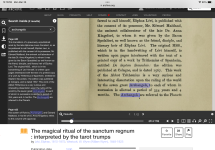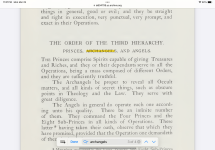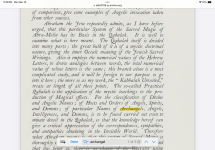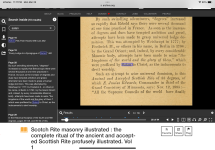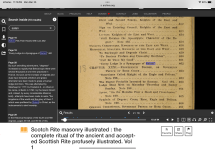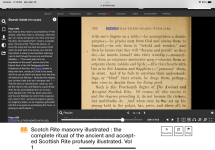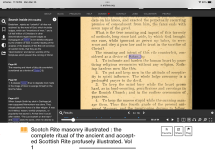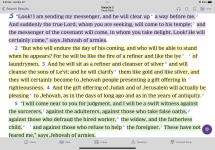ANGELS, DEMONS AND ELOHIM
by Anthony Buzzard
The existence of angelic “spirit beings,” both good and evil, is assumed without question by the biblical writers, and their views are of course shared by the Lord Jesus. Peter, for example, states that angels desire “to stoop down and peer into the affairs of salvation,” particularly the sufferings of the Messiah and the glorious events which would follow (1 Pet. 1:11, 12). Peter is aware also of a group of spirits who are at present “imprisoned” (1 Pet. 3:19), to whom Jesus preached after his resurrection (certainly not when he was dead!). This passage has been the subject of much controversy but need not present insuperable difficulty, once we realize that “spirits” are most naturally understood as angelic beings, and that the proclamation they received was accomplished by Christ after his resurrection from the dead. (The resurrected Christ is a “life-giving spirit” in a quite different sense, i.e., as a glorified man, 1 Cor. 15:45.)
Jesus was put to death “in the flesh,” that is, as a “flesh and blood” human being, but “made alive” as a “spirit” (1 Pet. 3:18). This is clearly the language of resurrection: “The Father raises the dead and makes them alive” (John 5:21). “He who raised up the Messiah will make your mortal bodies alive” (Rom. 8:11). “In Christ shall all be made alive” (1 Cor. 15:22). At this stage in human history, Jesus, only, has been “made alive” by resurrection. He has become a “life-imparting Spirit” (1 Cor. 15:45). It is the destiny of believers to share his resurrection life and become like him “life-imparting” spirits — not, of course, disembodied spirits, but endowed with a spiritual body: We shall be raised to life at the future coming of Jesus and given a “spiritual body” (1 Cor. 15:44). Elsewhere Paul says that we are to be “sons of God,” a new race of immortal rulers with Christ to be manifested at the Second Coming (Rom. 8:19. Cp. Luke 20:36, “sons of God” by resurrection into the New Age of the coming Kingdom). Jesus has already demonstrated something of that new life during his post-resurrection appearances to the faithful. His post-resurrection body was animated and driven by “spirit,” but nevertheless tangible and visible (Luke 24:39, 40).
Since Jesus was “made alive” at his resurrection, there is no need to introduce the alien notion into Peter’s discussion that Jesus was preaching while he was dead! Popular theology often loses track of the fact that Jesus was fully a human being, uniquely endowed with the divine spirit, but capable of death. The entire complex personality of Jesus died on the cross, not just part of him! The entire man Jesus was raised to life as a “life-imparting Spirit,” through resurrection. In this condition, post-resurrection, he went to announce his triumph to the “spirits held in prison.” “Spirit” is the term constantly used of demons in Matthew, Mark, and Luke, and we have a plain reference to good angels as spirits in Hebrews 1:14: “Are not the angels all ministering spirits?” It is sometimes contended that John, when he writes “Beloved, believe not every spirit” (1 John 4:1) uses “spirit” to mean a man. However, it is not the men themselves, but their spirits as the vehicle of the teaching they proclaim, which are in question. There is a parallel usage in 1 Corinthians 14:32: “The spirits of the prophets are subject to the prophets.” We are dealing here with that part of the mind which conveys spiritual teaching, either true or false. “Spirit,” therefore, does not designate the man himself, though it is used to describe a “spirit being,” i.e., an angel, good or bad. There is further strong evidence that Peter was dealing (1 Pet. 3:19) with angels, in verse 22, only three verses later, where the triumph of the resurrected Jesus means that “angels, authorities and powers are now subject to him [Christ]” (cp. Col. 2:10-15 and also Acts 23:8, where spirit is equivalent apparently to demon).
The preaching by Jesus to fallen spirits in prison occurred, then, after the resurrection.[1] Peter provides further information about the reason for the imprisonment of the spirits. They were disobedient during the time prior to the flood, when God’s long-suffering was being exercised. The reference is to the period mentioned in Genesis 6. It was at this time that the sons of God cohabited with the daughters of men. The term “sons of God” (“Bnay Elohim”) refers most naturally to angels: Job 38:7, “When the morning stars sang together and all the sons of God (‘Bnay Elohim’) shouted for joy.” Job 1:6, “The sons of God (‘Bnay Elohim’) came to present themselves before the Lord and ‘the Satan’ (‘ha Satan’) came also among them.” A very similar expression is found in Psalm 29:1 and 89:6, “Give unto the Lord, O sons of God (‘Bnay Elim’), the glory due to His name”; “Who among the sons of God (‘Bnay Elim’) is like the Lord?” A (not the) son of God (the Aramaic, in which this section of Daniel is written, being “var [son] Elohin”) appears in Daniel 3:25, and is evidently an angel.[2] Significantly, the Septuagint renders the sons of God in Genesis 6:2, 4 by “angels,” showing how Jewish expositors understood their own Scriptures. That the sons of God were righteous men seems to be excluded by the context which concerns the wickedness of the pre-flood world. There is also no good reason why righteous men marrying women would produce giants! “Sons of God” are placed in a different category when it is said that they married the “daughters of men.”
There is, however, weighty New Testament evidence to support a cohabitation of angelic beings with women in Genesis 6. The book of Jude, written by a brother of Jesus, refers to the sins of angels as “giving themselves over to fornication and going after strange flesh” (Jude 6, 7). These words are descriptive of the sins of the people of Sodom and Gomorrah, but Jude says that they were guilty of the same deviant behavior as the sinning angels. The AV is not as clear as it might be. The Greek reads as follows:
The angels who did not keep their own rule but deserted their own habitation, [God] has kept in perpetual chains [cp. 1 Pet. 3:19, “imprisoned”] under gloom [darkness] in view of the judgment of the Great Day; just as Sodom and Gomorrah and the surrounding cities in the same manner as those [angels] committed fornication and went after flesh of a different kind...(Jude 6, 7). [3]
Jude quotes elsewhere in his letter (Jude 14) from the non-biblical book of 1 Enoch (written around 200 BC). This Jewish writing attributes the origin of demons to the cohabitation of angels with women described in Genesis 6. It is therefore likely that these ideas were accepted both by the Church and the Jews. According to 1 Enoch 15:8, and elsewhere, “the giants [the nephilim of Gen. 6:4 and Num. 13:33] who are produced from [the cohabitation of] spirits and flesh, shall be called evil spirits upon the earth, and on the earth shall be their dwelling; because they are born from men, and from the holy watchers is their beginning and primal origin.” “Watchers” is the term used of angels both in the Bible (Dan. 4:13, 17) and outside it (1 Enoch 1:9; 12:2, 3, etc.). We do not suggest that extra-canonical books carry the authority of Scripture, but the plain statements of Jude about the fornication of angels cannot be dismissed. [4]
We have further information in 2 Peter 2:4 about the location of the angels who sinned: “If God did not spare the angels who sinned but consigning them to Tartarus in pits of gloom, He delivered them over to be kept for judgment...” Tartarus occurs only here in the New Testament. It was regarded by the Greeks as a subterranean region, and perhaps would be equated with the “abyss” under the sea from which the demons are said to emerge (Rev. 9:1, 11), headed by the angel of the abyss (Rev. 9:11). In concluding our discussion of the activity of the evil spirits described by Peter and Jude, we quote the RSV of Jude 6, 7: “The angels who [sinned]…just as Sodom and Gomorrah…which likewise acted immorally and indulged in unnatural lust.”
The objection that in Genesis 6 genuine marriages were contracted is inconclusive. The word “wives” (nashim) may be rendered as “women,” as often in the Old Testament.[5] The remark of Jesus that angels do not marry (Matt. 22:30), i.e., contract marriages and bear children, can hardly be taken to exclude the possibility of the quite unnatural sexual deviations ascribed by Genesis 6:2 to the sons of God. Jesus was speaking of holy angels. They do not procreate. Jude describes the deviant behavior of evil angels. Their conduct was of the same order as the activity practiced by Sodom and Gomorrah. There is no reason why marriages contracted between men and women should have produced a race of giants. The association of sexual sin with angels by Jude thus strongly suggests that the traditional Jewish understanding of Genesis 6 was the correct one. Note again that the sons of God cohabited with “the daughters of men.” The language suggests that two different orders of being are involved.
While the sinning angels are thought of as now being imprisoned in pits or caves of gloom, there exists a quite separate host of evil spirits who are active in this present age (Gal. 1:4). The existence of demons or unclean spirits is massively attested by Matthew, Mark and Luke. The witness of Luke as a physician (Col. 4:14) is particularly interesting. He makes it quite clear that Jesus was committed, with his disciples, to belief in the reality of Satan who is represented as an external influence analogous to “the fowls of the air” (Luke 8:5, 12). Satan is the Prince of the demons (Matt. 12:24, 27).
The Pharisees say: “This man is casting out demons by Beelzebub, ruler of the demons.” Jesus answered, “If Satan casts out Satan...If I by Beelzebub expel the demons...” Elsewhere (Matt. 25:41) he speaks of the fire prepared for the Devil and his angels. Paul sees the demons as purveyors of false teaching. His phrase means, of course, “doctrines taught by demons,” not “doctrines about demons”: “Some will depart from the faith in later times, attending to misleading spirits and teachings propagated by demons” (1 Tim. 4:1). Paul understands that the demons are the authors of counterfeit religion. An idolatrous sacrifice is nothing, nor is the idol itself, “but what they [the pagans] sacrifice, they sacrifice to demons and not to God; I do not wish you to take part in fellowship with the demons. You cannot drink the Lord’s cup [Communion] and the demon’s cup [the counterfeit communion]. You cannot share in the Lord’s table and the table of demons” (1 Cor. 10:19-22).
Some would have us believe that Paul thought the demons were non-existent! Their reality is, however, for Paul as clear as the reality of the One true God whom they attempt to impersonate in order to attract worship to themselves. It should be evident to all that the idol is not the same as the demon lying behind the idol. Thus, also, in Revelation 9:20: “They did not repent of the works of their hands made so that they can worship the demons and the gold, silver, bronze, stone and wooden idols.”
The activity of demons and Satan, their leader, is directed towards thwarting the progress of Christianity: “Our conflict is not against human beings, but against the rulers, authorities and world powers of the darkness [of this present age], against evil spirit beings located in heavenly places” (Eph. 6:12).
Paul had earlier spoken of this world-system (kosmos) as being in the hands of “the ruler of the authority which controls the air, the spirit now operating in the sons of disobedience” (Eph. 2:2). This personality is Satan, the “god of this age” (2 Cor. 4:4). He is no less real to Jesus and to Paul than God, the Father, described by Paul as the One God (1 Cor. 8:6). While Paul sees the spirit of Satan operating in the sons of disobedience (Eph. 2:2), he sees the Spirit of God likewise, but with totally different results, at work in His sons: “For it is God who is operating in you, both to will and to operate on behalf of His good pleasure” (Phil. 2:13).
The reality of the demons, as evil personalities external to and separate from man, is most vividly attested by Luke. The reader will accept or reject the account according to his assessment of Luke as a competent recorder of historical fact. It should be carefully noted that the demon is addressed by Jesus as a distinct, separate and intelligent personality. To say that Jesus told an abstract mental disorder to “keep quiet” and “come out” or that mental disorders “cried out” and recognized Jesus as Messiah is simply to explain away the historical account offered by Luke:
And in the synagogue there was a man with a spirit, an unclean demon, and he cried out in a loud voice and said: “What have we in common with you, Jesus, Nazarene? Have you come to destroy us?[6] I know who you are, the Holy One of Israel.” And Jesus rebuked him [the demon], and said: “Be silent and come out of him [the man],” and when the demon had thrown him [the man] into the midst, the demon came out of him without hurting him...And many demons went out and they [the demons] cried out: “You are the Christ, the Son of God.” And Jesus rebuked the demons and did not allow them [the demons] to speak, because they [the demons] recognized him as the Christ (Luke 4:33-35, 41).
Whatever ambiguity may arise from the standard versions is absolutely excluded in the Greek text, where it is required by the laws of agreement that the participles, which are neuter, refer back to the spirits which are neuter, and not to the victim (the man) who is masculine. To deny the New Testament belief in demons as real personalities in the face of Luke’s account, to say nothing of the ample testimony of the other gospels, amounts to a rejection of the evidence they present.
Some have proposed that Satan, the Devil, was created as an evil spirit rather than being created with free will and later falling from grace. The idea that Satan had no choice but to be evil is a most puzzling theory, since Jesus makes a plain statement about the future punishment of Satan and his angels (Matt. 25:41). There is no suggestion here that the evil angels and their leader are not equally guilty. But we have also a plain statement in 1 Timothy 3:6 that a young convert who succumbs to the temptation to become “puffed up” with pride falls into the condemnation of the devil, that is, he receives the same judgment which Satan received for his pride. This hardly suggests that Satan was created in a state of pride. How then could he have been judged, as Jesus says he has? “The ruler of this world has been judged” (John 16:11). If Satan was created evil, with no free will, how are we to understand that God curses him? Genesis 3:14: “Because you have done this, you are cursed above all cattle.” [7] That he was a murderer from the beginning (John 8:44) or that he sins from the beginning (1 John 3:8) need not imply that Satan had no choice, and thus no fall, and few will read those statements that way. The expression “from the beginning” must be handled with care. In 1 John 2:7 we read of a commandment which you had “from the beginning” (not the beginning of your life), and in 3:11 of a message heard “from the beginning.” The references to Satan in Isaiah 14 and Ezekiel 28 may be less certain than traditionally thought, but before they are dismissed, it must be shown that “cherub” (Ezek. 28:14) nowhere else applied to a man, applies only to the King of Tyre. Similarly in Isaiah 14, the “shining one, Star of the Dawn” could well refer both to the King of Babylon and Satan (rather in the manner that the Messianic references in the Psalms may apply to David and Christ). Satan is the one who energizes the King of Babylon, as he energizes also the man of sin (2 Thess. 2:9). It is not unnatural for the Hebrews to think of an agent and the power lying behind him in very similar terms, even including both in a single description. 1 Timothy 3:6 remains the strongest evidence for Paul’s belief that a man can become inflated with pride just as Satan had. The parallel falls to the ground if Satan had been created proud! Paul’s observations about Satan being transformed into an angel of light strongly imply that he is an angel of darkness (2 Cor. 11:14). The word here used by Paul, “transforms,” means the changing of the outward appearance, not the essential nature. Thus what appears as an angel of light must be in reality an angel of darkness.
Summarizing the Bible’s data on fallen angels, we conclude that the biblical writers shared the view of their contemporaries that Satan is the head of a host of fallen angels, whose wickedness included cohabitation with mortals. The offspring of these unions are said to be giants (Gen. 6), the men of renown or fame of old times. Could this be Satan’s ghastly parody of the race of immortals which God is now creating in Christ? They sound like the heroes of Greek mythology, which like most myths probably originated in fact. The second-century Christian Justin Martyr speaks of angels who “transgressed the divine ordering, and by sinful intercourse with women produced offspring who are demons” (2nd Apology, section 5). This was the traditional understanding around 150 AD. The product of a mortal with an immortal would presumably not be subject to death in the normal human sense. It is conceivable that they could survive death as disembodied spirits. [8] Though the precise origin of the demons of the Bible may not be provable beyond doubt, we should not reject out of hand the clear evidence presented for the existence of evil spirits. The reality of the demons is everywhere attested in Scripture. The Old Testament mentions the demons infrequently, but everywhere assumes them to be the powers behind false religion (Lev. 17:7; 2 Chron. 1:15; Isa. 13:21; 34:14; Deut. 32:17; Ps. 106:37 — both shed and sair being rendered as “demon.” The fact that they are described as “worthless” in no way implies that they were believed to be non-existent!).
Belief in Satan is held by the biblical writers and their contemporaries. In Jewish apocalyptic writings both Satan and Mastema occur as names for the Prince of Demons. Another name is Sammael, and in the rabbinical literature Satan is called the angel of death. The Prince of the Demons is also known as Azazel (cp. Lev. 16:7-28); and he has a further title, Beliar or Belial, which occurs in Psalm 18:5, and may be a reference to the destroyer, Satan. Paul uses the term, as his contemporaries did, to designate a being no less real to him than Christ or the holy angels: “What agreement has Christ with Beliar?” (2 Cor. 6:15).
In the rabbinical and biblical literature the demons are called “shedim” (probably related to a root meaning “to destroy”). Their aim is to deceive mankind into offering worship to them, rather than to God. This is a fundamental theme in the writings of Paul and John; the latter speaks of Satan, “who is deceiving the whole world” (Rev. 12:9); “the whole world lies under the power of the Evil One” (1 John 5:19). An Old Testament statement describes the false religion to which Israel gave herself: “They sacrificed to demons, not to God” (Eloah, the singular form of Elohim, Deut. 32:17). “They sacrificed their sons and daughters to demons” (Ps. 106:37). Female demons are mentioned outside the Bible and once in it. “Lilit [defined by the Brown, Drivers and Briggs Hebrew Lexicon as a female night-demon haunting desolate Edom] shall rest there” (Isa. 34:14). “Lilitu” finds a place similarly among the Babylonian demons. It is possible also that another demon, “Ketev” (Ps. 91:6; Deut. 32:24; Isa. 28:2; Hos. 13:14) is mentioned by name. The Septuagint renders the word by “demon” in Psalm 91:6. It is clear that the reality of demons as the authors and objects of false religion was accepted over the span of time represented by Moses in Deuteronomy 32:17 to Paul in 1 Corinthians 10. The books of James (2:19) and Revelation (9:20, 16:14; 18:2) also make clear reference to demons. (The word “daimon” is unfortunately mistranslated as “devil” throughout the KJV. There is only one Devil — “diabolus,” but many “demons.”)
HOLY ANGELS
The subject of good angels is no less important for the biblical writers: There is the angel of Yahweh (the Lord) who is distinct from Yahweh, as in Numbers 22:31: “The Lord opened the eyes of Balaam and he saw the angel of the Lord standing in the way.”
Judges 13:3, 6, 9: “An angel of the Lord appeared...Then the woman came and told her husband, ‘A man of God came to me and his face was like the face of an angel of God...’ The angel of God came again.”
Sometimes the angel is “identified” with Yahweh, in the sense that one who has seen the angel has, so to speak, seen God. Genesis 16:7ff: “An angel of Yahweh found Hagar...and spoke to her...And Hagar called the name of the Lord who spoke to her: ‘Thou God seest me.’”
Exodus 3:2: “The angel of the Lord appeared to Moses in a flame of fire out of the midst of the bush.” Stephen’s understanding of this passage is instructive. It should be noted that he did not think that the angel was Jesus in a preexistent form. Stephen would have believed with the Apostles that Jesus was foreseen by the Old Testament prophets and manifested for the first time at his birth (1 Pet. 1:20: “foreordained,” but manifested at his birth). Moses predicted of Jesus that God would cause “a prophet like me to appear from amongst your brothers” (Acts 7:37). This passage is the classic passage for the Christian understanding of the origin of the Messiah. Peter uses the same prediction of Moses (Deut. 18:15, 18) to describe the origin of Jesus (Acts 3:22). The New Testament was founded upon this understanding. In Acts 7:30, 31 Stephen discusses the episode of Moses at the burning bush: “An angel appeared to Moses in a flame of fire...There was a voice of the Lord: ‘I am the God of your fathers...’ The Lord said to him...The angel appeared to him at the bush...The angel spoke to him in Mount Sinai” (see verses 33, 35, 38). According to Exodus 20, God spoke to Moses. Yet Stephen says that an angel spoke to him, and that Moses received the law through the disposition of angels (Acts 7:53).
The implication is that the angel bears the name and authority of Yahweh. Exodus 23:20-22: “Behold I am sending an angel before you...Beware of him and obey his voice...Do not provoke him; he will not pardon your transgressions; my Name is in him...If you will indeed obey his voice and do all that I say...”
The angel of the Lord is appropriately called “the angel of God’s presence.” Isaiah 63:9: “In all their [Israel’s] afflictions He was afflicted, and the angel of His presence saved them.”
It may properly be said that the Lord speaks, when in fact the angel speaks. This will explain the categorical statement of Jesus in John 1:18, “No one has seen God at any time.” (This is definitive evidence that Jesus was not God, though, like the angel of the Lord he represents the presence of God, his Father with us, 2 Cor. 5:19.)
The angels are said to have been present at the creation (Job 38:7), and must therefore have been created before it. The term “host” (army) is used to describe the whole organized company of angels. For those who do not believe in evil angels, Isaiah 24:21 will be instructive: “It will come to pass in that day that the Lord will punish the company of angel-princes on high [see BDB Lexicon, p. 839] and the kings of the earth on the earth.”
In the Septuagint of Psalm 148:1-3, “all His hosts” (of angels) is rendered “all His powers” (dunameis). “Hosts” here are parallel to “angels.” This will give us the meaning of the word “powers” frequently used in the New Testament of the authorities in heaven. In Jewish literature “powers” are frequently listed with the Angel of the Divine presence (i.e., the angel representing Yahweh, Isa. 63:9). In Mark 13:25 the “powers” which are in the heavens will be shaken, that is, the evil authorities now controlling the heaven (cp. “prince of the power of the air,” Eph. 2:2) will be defeated and replaced by the government of the Messiah. In Luke 2:13 there appears with the angel a multitude, a heavenly army (host) of angels.
Angels are described as “fiery.” Hebrews 1:7: “His angels [are] spirits, His ministers a flame of fire” (cp. seraphim = “burning ones”). Angels are associated with the elements: Rev. 7:1, they hold the four winds; 14:18, they are associated with fire; 16:5, with waters; 19:17, an angel stands in the sun. Paul speaks of wicked angels as the “elements of the world” (Col. 2:8, 20). The Jews knew of seven holy archangels by name. Only two of these are mentioned by name in the Bible (Gabriel, in Dan. 8:16; 9:21; Luke 1:19, 26; Michael, the patron angel of Israel, Dan. 10:10, 13, 21; 12:1; Jude 9; Rev. 12:7). In the latter passage Satan is at war supported by his angels; his enemy is Michael and his angels. 1 Enoch lists seven archangels by name. This idea was derived from Ezekiel 9:2-11: “And, behold, six men came from the way of the upper gate...and one man in the midst of them clothed with linen.” In Revelation 1:4 seven spirits are before God’s throne (see also 1:20; 3:1; 4:5; 5:6; 8:2, 6). Since spirits = angels in the New Testament, this may be a confirmation of the Jewish understanding of seven principal angels. Just as Michael is the guardian angel of Israel, individual believers are protected by an angel: Matthew 18:10, “Their angels constantly behold the face of my Father who is in heaven” (cp. Ps. 34:7, “The angel of the Lord encamps around those who fear Him”). In Acts 12:15, Peter is known to have a protecting angel: “It is his angel.”
ELOHIM AND THE ANGELS
It is an obvious feature of the Old Testament that the name of God (Elohim) is given also to angels. Psalm 8:5, quoted in Hebrews 2:7, states that man is lower than the angels (Elohim). Elohim is also a word for human kings and judges (Ex. 22:8-9: “judges” = “elohim”). The use of the divine name for human beings is appropriate because they hold power delegated to them by the One God (cp. Ps. 82:6: “You [human rulers] are gods [Elohim]”). We have already quoted the passage in Exodus 23:21 where the angel bears the name of God, as God’s representative. We note also the activity of the angel in Exodus 14:19: “And the angel of God who went before the camp of Israel removed and went behind them.”
The identification of the angel with Yahweh does not, of course, mean that the angel is “coequal” or “co-essential” with Yahweh. The angel is always subordinate to God; yet because he represents God, his words can be ascribed to God Himself, though the latter does not speak or appear. Examples have already been cited. Other examples are found in Genesis 18:1, 2: “The Lord appeared...Three men stood before Abraham...The men turned their faces away...but Abraham stood yet before the Lord [v. 22].” 19:1: “The angels came to Sodom....The Lord has sent us [v. 13]...Oh, not so, my Lord [the term used for addressing God] [v. 18]...Then Yahweh rained brimstone from Yahweh out of heaven” (v. 24). It is clear once again that the angel fully represents God and speaks for Him. Thus, also, the law which was given by God was “ordained by angels” (Gal. 3:19). “The word of the law was spoken by angels” (Heb. 2:2).
At this point it must be emphasized that the writer to the Hebrews never suggests that it was Christ who mediated the law. He gives not the slightest indication that Jesus was the angel of the Lord of the Old Testament. The whole thrust of the argument in Hebrews is that Christ is not an angel, and that God did not speak through Jesus in the Old Testament:
“God...of old spoke to the fathers in the prophets and spoke in these last days in a Son.” The Son is a “mediator of a better covenant” and therefore did not mediate the Old Covenant (Heb. 8:6). The creation in Genesis 1 is specifically attributed to God, the Father: “For it was fitting for Him [the Father], because of whom, and through whom all things exist, in bringing many sons to glory, to perfect the author of their salvation [Jesus] through sufferings” (Heb. 2:10).
It was God (the term used by the writer to designate the Father) “who rested on the seventh day from all His works” (4:4: “God rested from His works”).
The status of Christ is that of “Son of Man,” “made a little lower than the angels [Elohim]” (2:6, 9). The argument is that he was made lower than the angels, but that his destiny is far greater than theirs: He was begotten as the Messianic Son (1:5). He is to have a throne in the “inhabited earth of the future about which we are speaking,” (2:5), when “He [God] again brings [at the Second Coming — see NASV] the first-born into the inhabited earth” (1:6). As Messianic King, he (Jesus) is addressed as “God,” a title ascribed to the Messianic King in Psalm 45:6. Before it is concluded that this means “God” in the same sense that the term is used of the Father (some 1300 times in the NT), it must be remembered that Moses and the angels and the judges were also addressed as “God.” The context in Psalm 45 will show that the divinely inspired Messiah-King is being described, but it is not suggested that he has existed from eternity. He is definitely begotten in time: “This day I have begotten you” (Ps. 2:7; Heb. 1:5).
We revert to the question of the Old Testament angel (which the writer to the Hebrews says Jesus is not — Heb. 1:5). Many other passages show that the angel “stands for” Yahweh:
Joshua 5:14: “As captain of the host of Yahweh I have come...Yahweh said to Joshua...”
Judges 6:11, 12: “An angel of Yahweh...Yahweh looked at him [v. 14]. The angel of God...The angel of Yahweh [vv. 20, 21]...Gideon understood that he was an angel of Yahweh...I have seen an angel of the Lord face to face...Yahweh said to him” (vv. 16, 23).
1 Chronicles 21:5: “God sent an angel...and David saw the angel of Yahweh [vv. 16, 17]...and fell on his face and said to God...The angel of Yahweh commanded Gad to say to David...and David went up at the saying of Gad, which he spoke in the name of Yahweh [vv. 18, 19].”
It has sometimes been contended that the name Yahweh is given to two persons in the same sentence: Genesis 19:24, “Yahweh rained brimstone...from Yahweh out of heaven.” Before leaping to the conclusion that two persons are called Yahweh, the following statement from 1 Kings 8:1 should be considered: “Then Solomon assembled the elders of Israel to King Solomon in Jerusalem.” This is clearly a distinctive Hebrew “manner of speaking” and gives no support for a theory which would contradict hundreds of biblical statements that God is a single person (Deut. 6:4; 1 Cor. 8:6; 1 Tim. 2:5; John 17:3).
The purpose of this discussion of the function of the angel of Yahweh is to show the application of the divine name Yahweh to a subordinate of God who represents Him. This will be important when the title “Lord” (Yahweh) is used of Jesus as fulfilling Old Testament prophecy. Activity which is predicated of Yahweh in the Old Testament will be accomplished by the Messiah. This does not, however, mean that Jesus is Yahweh, any more than that the angel of Yahweh speaking as “the Lord” (Yahweh) (Judges 6:16, 20, etc.) is actually Yahweh. The Hebrew principle of “representation” allows flexibility in the use of divine titles for people and places where God is represented. Thus in Jeremiah 23:6 the Messiah will be called Yahweh Our Righteousness, but in Jeremiah 33:16 the city of Jerusalem will be addressed by the same title: “She shall be called ‘Yahweh Our Righteousness.’” This does not of course mean that Jerusalem is Yahweh! Similarly, lest anyone should think that the angel of the Lord was equivalent in essence or divinity to Yahweh Himself, Exodus 33:2, 3, 5 should be considered:
“I will send an angel before you...for I will not go up in the midst of you, lest I consume you in the way. And when the people heard this bad news they mourned.” It is clear that the angel was not considered to be “co-equal” with Yahweh (the passage would pose some problem for those who maintain that the angel was Christ). The angel represented the “presence” of God. Exodus 33:14: “My presence will go with you.” We must emphasize again that Moses was taught to think of the function of the coming Messiah as different from the ministry conducted by Yahweh through His angel:
“To that prophet you will listen. This is according to all that you asked of the Lord your God in Horeb...when you said, ‘Let me not hear again the voice of the Lord my God’” (Deut. 18:15-16). Nevertheless, the Lord will put His words into the mouth of that prophet (v. 18). This prophecy is fulfilled in the life of Jesus of Nazareth (Acts 3:22; 7:37). It is also the basis of the New Testament doctrine of Christ. He is clearly not Yahweh; as a prophet, he is of the same order as Moses; yet Yahweh speaks through him uniquely and finally (Heb. 1:2). Thus Paul can say that “God was in Christ, reconciling the world to Himself” (2 Cor. 5:19). “The fullness of the Deity dwells in him bodily” (Col. 2:9), but he is nevertheless essentially the man who is the one mediator between God and man (1 Tim. 2:5).
We may conclude from the evidence that angels assume the name and authority of God when they represent Him. On this same principle it is not unusual for the prophets to say that God Himself will perform what later the Messiah performs. This is not, however, to confuse the personalities of the Father and Son, and it does not in any way disturb the truth declared by Jesus that “The Father is greater than I” (John 14:28) and that He is “the only true God” (John 17:3). The previous phrase should be read too: “I am going to the Father, for the Father is greater than I.” We can hardly conclude from this statement that the Father was greater only while Jesus was absent from Him! It is after all the Father who alone has “life in Himself” (i.e., He alone is self-existent, the very meaning of Yahweh), and has given the Son the gift of life (John 5:26). The Son perfectly represents the Father. What is done by the Son reflects perfectly what the Father is doing. Similarly, without any confusion of identity, what is done to believers is done to Christ: “Whatever you did for one of the least of these brothers and sisters of mine, you did for me” (Matt. 25:40). So also in Zechariah 12:10, “the Israelites will look upon Me whom they have pierced and will mourn for Him.” Here Yahweh is speaking; yet it was the Son who was pierced and will be seen. Yahweh was pierced, so to speak, when the Son was pierced. This does not for John make Jesus God in the absolute sense, for Jesus speaks of the glory which comes from “the only God” (“from Him who alone is God,” Plummer, Cambridge Greek Testament, p. 143). John’s other important statement about the Godhead shows no departure from the strict unitarian view of God which he inherited from the faith of Israel: In 17:3, he summarizes the Christian faith: “This is the Life of the Coming Age: that they may come to know you, the only true God, and the one whom you sent, Jesus Christ.” The unity of God has not been disturbed even by the coming of the one who is truly Son.
It is sometimes argued that the plural form of Elohim (God), used with a singular verb, proves that a plurality of personalities was indicated by the Divine Name. It is significant that scholars are hesitant to use such an argument, and for good reason. The lexicons and grammars of Old Testament Hebrew describe the plural form with singular meaning as a “plural of majesty.” If Elohim is to mean more than one person in the Godhead, the Jews will have misunderstood the basic teaching of their Scriptures. They were prepared to die for the belief that God was personally one. If the argument about the plural form of Elohim is to be sustained, it will have to be shown why Elohim is used of Dagon, a single pagan god (Jud. 16:23); why the goddess Ashtoreth, the god of Chemosh, and the god Milcom (1 Kings 11:33) are each plural (Elohim is used of each separately); why Moses is an “Elohim” (Ex. 4:16; 7:1); why Christ is addressed as “Elohim” (Ps. 45:6; Heb. 1:8) while the Father who anoints him is still “plural” — “Elohim” (v. 7). And if the plural “Elohim” really means more than one person, some explanation must be offered for the significance of the singular form of the same word “Eloah” to designate the same God as the object of true worship (Deut. 32:17, etc.). It should be noted that Yahweh may be joined to the plural form “Adonim” (Lord) or to the singular form “Adon” (Ex. 23:17).
The intensive plural of rank occurs in the plural “Adonim” in 1 Kings 16:24: “Shemar, the owner [plural] of the hill”; Judges 19: “The servant said to his master [plural]”; Isa. 24:2: “As with the servant, so with his master [plural], as with the maid so with her mistress [singular].” The parallel shows that the plural form has singular meaning. Judges 19:26, 27: “The woman fell down where her husband [plural] was.” 2 Kings 2:16: “Let them go and seek your master [plural], Elijah.” Elijah was one person!
The same plural form with singular meaning occurs in the word “Baal,” Master. The lexicon notes that the word is “often plural with singular meaning” (Brown, Driver and Briggs, p. 127). In Isaiah 54:5, it has been noted that “maker” and “husband” are plural in form. Yet “the Lord of Hosts is His name.” If any significance were to be attached to these, we would expect “thy redeemer,” equally predicated of Yahweh, to be plural. Its form, however, is singular.
The claim that “Elohim” shows plurality of personality in the Godhead cannot be sustained. That God is numerically and personally “One” has been declared by the Apostles in unmistakable terms, when they say: “There is no other God but One; there is to us One God, the Father, and one Lord Jesus Christ. One God and Father who is over all. One God and one mediator between God and man, the man Jesus Christ...One God who is ‘the only God, our Savior, [worshipped] through Jesus Christ the Lord’” (Eph. 4:5, 1 Tim. 2:5, Jude 25).
It will not be difficult to see that Paul’s great unitarian statements are virtually quotations from the Old Testament’s declaration of the unity of the One God. Thus in Isaiah 45:5, 6, “I am Yahweh, and there is none else; except Me, there is no Elohim...I am Yahweh, and there is none else.” Isaiah 46:9: “I am God [El, singular], and there is none else; I am God [Elohim, plural] and there is none other than I.” Paul has defined that One God as the Father, from whom everything comes (1 Cor. 8:6). The important preposition “from” will be found nowhere in the New Testament referring to Jesus as the source of the creation. The Father stands alone as the One God, the creator of all things. Around this central truth the doctrine of God must be built. The quotation above which uses the plural, Elohim, and the singular, El, in the same sentence hardly suggests that Elohim is supposed to designate a plurality of persons in the Godhead. The significance of the plural form, where it is used, is rather to indicate the plurality and totality of the divine attributes existing in the One Person of the One God. Upon this central Truth a pathway back to the New Testament faith may be forged. If this should seem difficult, perhaps we should be reminded of the words of the Anglican theologian, John Burnaby, who admits that the doctrine of the Trinity “may or may not be justifiable in itself...and in any case can claim no final validity.” [9] Would that zealous exponents of Trinitarianism had heeded those words!
The words of the Harvard professor and historian, Fagginer Auer, are informative:
Fourth-century Trinitarianism did not reflect accurately early Christian teaching regarding the nature of God; it was, on the contrary, a deviation from this teaching. It developed against constant unitarian opposition and was never wholly victorious. The dogma of the Trinity owes its existence to abstract speculation on the part of a minority of scholars.[10]
The remarks of Maurice Wiles should warn us against claiming one thing and doing another: “The church has not usually in practice (whatever it may have claimed to be doing in theory) based its Christology exclusively on the witness of the New Testament.”[11]
In another connection, that of our understanding of the nature of man, Harry Emerson Fosdick says:
The difference is obvious between the mental patterns of the New Testament and most of our accustomed Christian thinking...The explanation of this contrast lies in the fact that historic Christian thought in this regard, as in others, has been Greek rather than Hebrew. Claiming to be founded on the Scripture, it has, as a matter of fact, completely surrendered many scriptural frameworks of thinking and has accepted the Greek counterparts instead.”[12]
It must be the task of every seeker of Truth who takes seriously the New Testament warnings that worship directed to God within the mold of Greek philosophy rather than in the Spirit and Truth of Scripture is in vain, to verify his creed in the light of the Bible (Matt. 15:9). The acquisition of understanding based exclusively on the New Testament, without the interference of the later traditions forming the heart of the doctrine of the Roman Catholic Church (and Protestant revisions of that doctrine), will be the best insurance against the supreme tragedy of disappointment “in that Day,” when Jesus will say to many: “I know not whence you are.” Those addressed will claim that they have been taught by Jesus and have eaten and drunk in his presence. This can only mean that they had thought they were Christians (Matt. 7:22; Luke 13:24-28) but had been tragically misled.
[1] The theory that this preaching was accomplished by Noah misses the point. Christ is the subject in 1 Pet. 3:19. The spirits were disobedient in Noah’s time, then imprisoned and later addressed by Christ after his resurrection. Cp. Henry Alford’s remark: “It must be evident to every unprejudiced scholar how alien such an interpretation [i.e., that Noah preached to the spirits] is from the plain meaning of the words and the clauses” (Greek Testament).
[2] See verse 28.
[3] The KJV is unclear, since it omits the words “those (angels).”
[4] These remarks are not intended to rule out other explanations. What is proposed seems to be the most natural reading of the evidence, and is backed by many expositors, e.g., Alford, Driver, etc. “Bnay Elohim” means angels in all its occurrences in the Hebrew Bible.
[5] The KJV may also be correct
[6] The demon speaks as one of a class of demons.
[7] Satan is identified as the serpent of the Garden of Eden in Rev. 20:2.
[8] The idea that the faithful dead are now “spirits” or “souls” in heaven is not found in the Bible. Demons are spirits alive in the cosmos. The human dead are all buried in the ground where “they do not know anything” (Ecc. 9:5). It would therefore be perilous to associate oneself with systems of theology that approve any form of contact with or reliance on “spirits” or “saints” in heaven. Mary, herself, is included in the dead who await resurrection when Jesus returns (1 Cor. 15:23; cp. John 11:24).
[9] The Belief of Christendom, p. 196.
[10] Lowell Institute Lectures, Boston, 1933.
[11] The Remaking of Christian Doctrine, pp. 54, 55.
[12] A Guide to Understanding the Bible, Harper Bros., 1938 p. 93, emphasis added.
Source: http://focusonthekingdom.org/articles_/angels.htm

